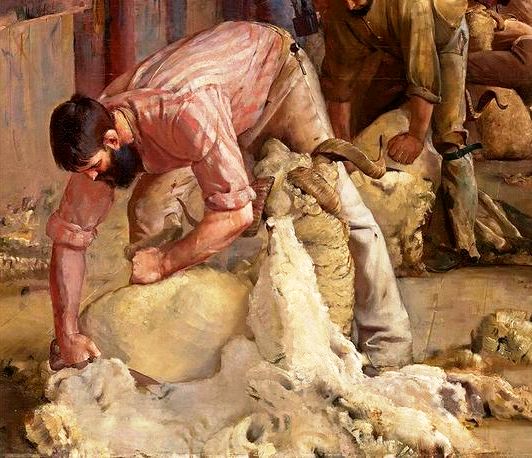Difference between revisions of "Shearing Station"
Tao alexis (talk | contribs) |
Tao alexis (talk | contribs) |
||
| (3 intermediate revisions by the same user not shown) | |||
| Line 2: | Line 2: | ||
'''Shearing stations''' exist for the purpose of removing wool from [[Sheep|sheep]], work that requires such skill that sheep farmers appreciate letting an expert do it. The station includes gates and pens for the management of sheep brought in to be sheared, ensuring sheep are not injured by crowding. A section made to provide cover against the rain is large enough to protect 25 sheep, enabling their wool to dry; this drying is facilitated by the warmth of the sheep themselves as they cluster together. | '''Shearing stations''' exist for the purpose of removing wool from [[Sheep|sheep]], work that requires such skill that sheep farmers appreciate letting an expert do it. The station includes gates and pens for the management of sheep brought in to be sheared, ensuring sheep are not injured by crowding. A section made to provide cover against the rain is large enough to protect 25 sheep, enabling their wool to dry; this drying is facilitated by the warmth of the sheep themselves as they cluster together. | ||
| − | The remaining parts of the station consist of the shearer's living space, a [[ | + | The remaining parts of the station consist of the shearer's living space, a somewhat more developed [[Hovel|hovel]] of mixed wattle, daub and half-timbered construction, made to support a family and potentially an apprentice shearer. The population of a shearing station is reliably about 3-9 people. Persons in the house will be one or two spouses, an elder or two, and children. |
When not actively shearing sheep, a sheep shearer usually manages a [[Measurements#Land|bovate]]-sized [[Farmland|farm]]. | When not actively shearing sheep, a sheep shearer usually manages a [[Measurements#Land|bovate]]-sized [[Farmland|farm]]. | ||
| Line 14: | Line 14: | ||
== Location == | == Location == | ||
| − | Shearing stations only exist in provinces that possess at least one sheep [[Trade | + | Shearing stations only exist in provinces that possess at least one sheep [[Trade References|reference]]. Otherwise, there's no reason for this facility to exist. |
Latest revision as of 23:20, 1 January 2023
Shearing stations exist for the purpose of removing wool from sheep, work that requires such skill that sheep farmers appreciate letting an expert do it. The station includes gates and pens for the management of sheep brought in to be sheared, ensuring sheep are not injured by crowding. A section made to provide cover against the rain is large enough to protect 25 sheep, enabling their wool to dry; this drying is facilitated by the warmth of the sheep themselves as they cluster together.
The remaining parts of the station consist of the shearer's living space, a somewhat more developed hovel of mixed wattle, daub and half-timbered construction, made to support a family and potentially an apprentice shearer. The population of a shearing station is reliably about 3-9 people. Persons in the house will be one or two spouses, an elder or two, and children.
When not actively shearing sheep, a sheep shearer usually manages a bovate-sized farm.
Shearing
Spring is the most common season for shearing sheep, though they may be sheared at any time as long as there's enough wool to keep the animals warm in the winter. Two shearers work continously, either removing the fleece or directing the sheep from pen to pen. These may be parent and offspring, siblings or master and apprentice.
The shearer completes the shearing of each sheep in the space of five minutes, allowing up to 50 sheep a day to be sheared. The fleece reliably comes off in a single piece. Thereupon, the sheep is removed into the shorn-sheep pen. The client pays the shearer two fleeces of every fifty that are shorn, with the choice going to the shearer.
A storehouse, designed for dryness, is used to store fleece at the station. Depending on the availability of labour, the eldest offspring or an elder is responsible for carding the fleece before it's carted to market.
Location
Shearing stations only exist in provinces that possess at least one sheep reference. Otherwise, there's no reason for this facility to exist.
See also,
Hammer (symbol)
The Adventure
Type-7 hex
